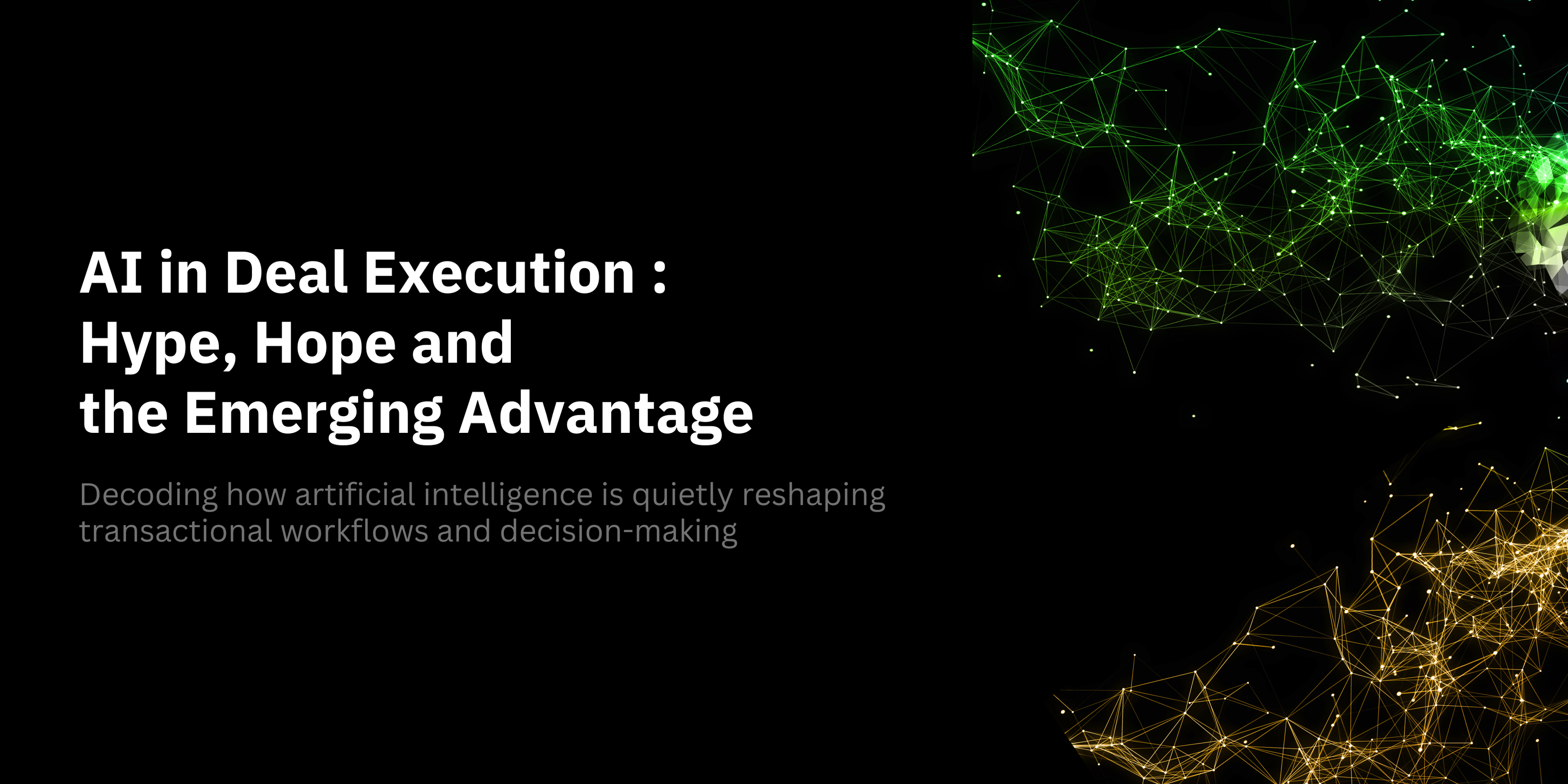AI as Execution Infrastructure
Artificial Intelligence has dominated headlines, from generative tools transforming content creation to machine learning algorithms steering capital markets. Yet in the nuanced world of deal execution, AI’s influence has been more subdued, less theatrical, but no less profound.
AI is building a quiet architecture shift - a new substrate on which smarter, faster, and more scalable deal workflows can be built.
It is not replacing human judgment. It is augmenting it, accelerating it, and reducing friction across the lifecycle of a deal.
Where AI Already Works : Hidden Efficiencies in Plain Sight
Much of AI’s value today lies in intelligent automation rather than sentient insight. In deal execution, this includes:
- Automated data extraction from financial documents, contracts, and statements
- Smart tagging and structuring of due diligence materials
- Natural language generation for teasers, CIMs, and internal memos
- Predictive flagging of anomalies in models and assumptions
These tools don’t reinvent the deal. They compress the effort required to produce standard deliverables, freeing analysts and associates to focus on higher-order thinking.
At Yajur, we’ve begun selectively deploying AI-assisted workflows, reducing document prep times by up to 40% while enhancing accuracy through standardized checks.
Due Diligence at Machine Speed: Pattern Recognition Over Manual Mining
Due diligence remains one of the most resource-intensive phases in a deal. Traditional approaches rely on manual review, item-by-item verification, and human memory.
AI offers a shift:
- Contract analytics tools can extract obligations, change of control clauses, and red flags at scale
- Document comparison engines can track inconsistencies between drafts or conflicting clauses
- Financial anomaly detectors can spot outliers across thousands of ledger entries in seconds
This enables faster deal assessment and earlier risk surfacing—especially valuable in time-compressed or multi-party processes.
However, AI does not replace context. It accelerates identification but still depends on human interpretation and strategic framing.
Enhancing Buyer Matching and Outreach
One of the most promising frontiers of AI in M&A is buyer intelligence. AI-driven platforms now:
- Analyze past transactions, investment theses, and sector behaviors
- Map buyer preferences across hundreds of dimensions
- Suggest high-probability buyer lists beyond the obvious suspects
This reduces the time spent on buyer research and increases hit-rate precision during outreach. Generative AI also enables personalized, on-brand communications at scale, tailoring emails, teasers, or cover notes to different buyer personas in minutes.
At Yajur, we see this as a strategic amplifier, allowing boutique IBs and advisory firms to operate at enterprise sophistication levels without enterprise overhead.
AI and the Model: Forecasting Meets Scenario Intelligence
Financial modelling has long been considered too subjective for AI automation. But recent advances suggest otherwise.
Machine learning models can now:
- Forecast growth based on industry-specific drivers and market conditions
- Run thousands of valuation scenarios using macro and micro variables
- Suggest sensitivity thresholds based on historical analogs
This doesn’t eliminate human modeling. It supplements it, especially in stress-testing assumptions, generating alternate outcomes, and reducing blind spots.
The key lies in using AI not for deterministic output, but for option framing, expanding the strategic canvas for decision-makers.
Cautions and Ethical Frontiers: Know the Limits
AI’s value in deal execution is bounded by two realities:
- Contextual nuance: No machine understands founder psychology, boardroom history, or inter-personal dynamics that often dictate deal direction.
- Confidentiality and data governance: Leveraging AI in confidential processes requires secure environments, strict controls, and compliance with cross-border data laws.
Furthermore, reliance on AI without clear human oversight risks false confidence in pattern over judgment. At Yajur, we advocate a 'human-in-the-loop' philosophy, AI as an accelerator, not an authority.
Augmentation, Not Automation
The future of deal execution will not be human vs. machine. It will be human, enhanced by machine, where intelligence is distributed across systems, and value is derived from orchestration, not just insight.
At Yajur Knowledge Solutions, we are actively investing in understanding and integrating AI into our processes, not as a shiny object, but as a serious enabler of quality, speed, and strategic foresight.
Because in the evolving world of deal advisory, the firms that master the intersection of judgment and automation will be the ones who lead, not follow.






